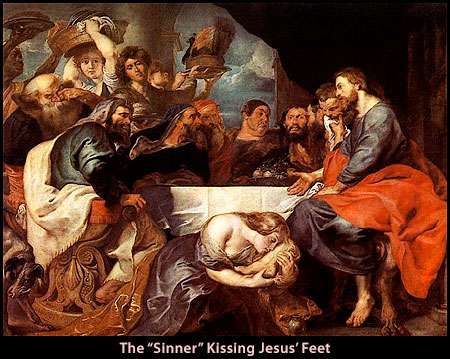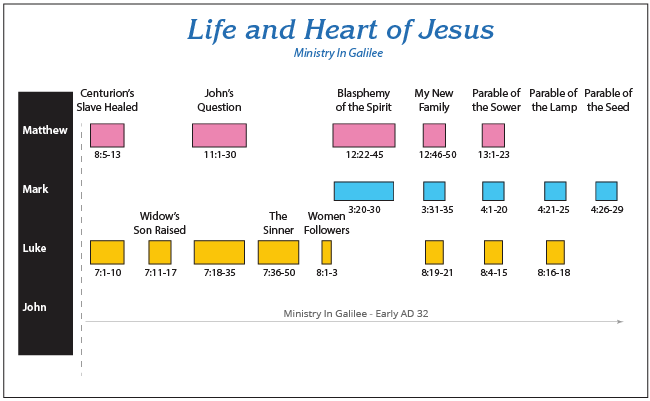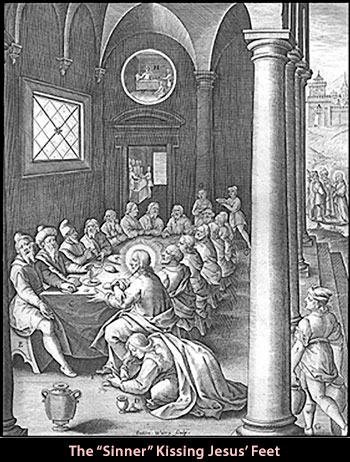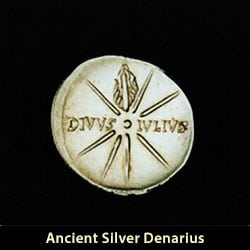Our study follows Jesus’ difficult encounter with John the Baptist’s two disciples and His explanation to the crowd about the identity and ministry of John the Baptist. Two of John’s disciples had been sent to Jesus to discover if He was in fact the promised one, the Messiah (Matthew 11:2). John had some doubts. After Jesus had authenticated His claim to be the Messiah by performing miracles, the two disciples returned to John. Then Jesus explained to the crowd and His own disciples that John was both the promised forerunner of the Messiah (Malachi 3:1) and Elijah who was to come before the Day of the Lord (Malachi 4:5). Jesus had explained that the criticism of John and Himself was malicious and fickle. The Jewish leaders had accused John of having a demon. They also accused Jesus of being a glutton and a friend of tax-gatherers and sinners because He had gone to Matthew’s party and met his friends (Matthew 9:9-13; Mark 2:13-17; Luke 5:27-32). Both John and Jesus had been predicting that the Kingdom of Heaven was coming and both had been calling people to repent. Both had been very popular with the people but not with the Jewish religious leaders whom they had been calling to repent (Matthew 3:7-11). When we come to this study, we are stunned to learn that one of these religious leaders has invited Jesus to dinner. Why? We also discover that a woman who was called a sinner by the religious leaders had joined the party too!

The Situation
So far the religious leaders have been bold and authoritative, challenging Jesus when He forgave sins (Luke 5:12-26), performed miracles (Luke 6:6-11; John 5:1-17) or taught truths that they did not like (Luke 6:1-5; John 5:18-47). They did not approve of Jesus’ standard of holiness and consequently rebuked Him. The jealousy and the conflict had been growing (John 3:25-30). Just recently in our studies we discovered that they now planned to kill Him (John 5:18).
Why was Jesus invited to a religious leader’s dinner party? Were they curious about Jesus? If we look ahead to John 7:45-52, we can listen to a conversation between some of the religious leaders and temple officers or guards. The passage implies that some of the temple officers had been directed to bring Jesus to the leaders. When they returned without Jesus, they were asked why they did not bring Him. Here is their reply,
The officers answered, “Never has a man spoken the way this man speaks.” John 7:46 (NASB)
Then one of the Pharisees stated, “No one of the rulers or Pharisees has believed in Him has he?” It is obvious that this Pharisee did not believe. Then Nicodemus, the Pharisee who visited Jesus in John 3, encouraged them to not quickly judge Jesus. Here is the response he received.
They answered him, “You are not also from Galilee, are you? Search, and see that no prophet arises out of Galilee.” John 7:52 (NASB)
This reveals that the Pharisees were not in agreement with one another.
So the invitation could have been given by some curious religious leaders. Or, was the invitation simply to a formal dinner to discuss religious business issues with Jesus? The answers to these questions will be found in this study.
The Dinner Party
It was the custom of the day for the leader of the group to invite the guest to dinner.
Now one of the Pharisees was requesting Him to dine with him, and He entered the Pharisee’s house and reclined at the table. Luke 7:36 (NASB)
Later in Luke 7:40 and 44 we will discover that his name was Simon. Verse 49 also reveals that there were other religious leaders present too! It was Jesus and a group of Jewish religious leaders. It might have included both Pharisees and Sadducees.
It was customary in Jesus’ day 1) to greet the guests with a kiss on the cheek, 2) to offer guests some water so that they could wash their feet, and 3) to anoint their heads with some oil. Guests were typically seated near the one who had invited them to dinner. Since they reclined on a low couch or sofa that was near the floor during dinner, their feet were positioned outward away from the table of food.
It is amazing what the gospel writers have left out of the account of this dinner party. The writings of most ancient secular writers focused on the delicious, rare and exotic foods of the wealthy and privileged. Elaborate descriptions of the food were common, but nothing like that occurs here. Once again we discover that the gospel writers are only interested in the facts – what happened. They are not interested in exaggeration or hyperbole. They recorded the essential facts. They did not need to invent or hype the story. The facts were enough!
A woman – “a sinner” – also came to the party with an alabaster vial of perfume.
And there was a woman in the city who was a sinner; and when she learned that He was reclining at the table in the Pharisee’s house, she brought an alabaster vial of perfume, and standing behind Him at His feet, weeping, she began to wet His feet with her tears, and kept wiping them with the hair of her head, and kissing His feet and anointing them with the perfume. Luke 7:37-38 (NASB)
She had heard about the dinner – “reclining at table” – picked up her alabaster vial and went to the party. According to the culture, the small vial of perfume would have hung around her neck by a cord. For us today her arrival at the dinner party would appear to be rude and inappropriate. How many people today invite themselves to a private party? But it was acceptable in Jesus’ day for people to come to a party to watch and listen to the conversation. They were not allowed to eat, but they could observe. She was not interested in eating. She came with one purpose and only one purpose. She came to anoint Jesus’ feet.

She Began To Cry
As Jesus was eating, the woman stood at His feet. Contrary to that depicted in much of the medieval art, He would have been reclining with His head near the food and His feet would have been outward. How long was she there? We do not know, but at some point she started to cry. As she listened to the conversation she may have heard Him say, “Blessed are those who are poor in heart” or “Blessed are the those who mourn.” Or, she could have heard something that she had heard Him teach before. She could have been one among the many people who had heard Him during the Sermon on the Mount (Matthew 4:23-5:1) or watched Him heal the leper (Matthew 8:1). She might have been there when Jesus spoke about John the Baptist (Matthew 11:7) or been one of those who came seeking to be healed (Luke 4:42). The crowds were constantly seeking Jesus, and so was she.
At some point during the conversation she finally broke down and began to cry. Was there something that Jesus said that caused her to cry? Or, was she so overwhelmed with His love and grace that her tears just came? The Greek word translated as “weeping” in verse 38 comes from the word KLAIO. It is a present participle which means that she was crying and crying. We are also told that she cried so much that her tears were BRECHO. That is, her tears were drenching His feet. This woman was crying uncontrollably! She was beside herself. She could not stop!
So she started wiping her tears off His feet, anointing His feet with perfume from her alabaster vial, and repeatedly kissing His feet. The Greek text once again reveals an important point. She was continuously wiping the tears off His feet, kissing His feet and anointing His feet. This woman was worshiping Jesus. She loved Him with all her heart, soul, and mind. She did not care that she was embarrassing herself.

Used Courtesy of www.catholic-resources.org
Reading Your Mind
When Simon saw this he was upset,
Now when the Pharisee who had invited Him saw this, he said to himself, “If this man were a prophet He would know who and what sort of person this woman is who is touching Him, that she is a sinner.” Luke 7:39 (NASB)
He did not have compassion for this very emotional, crying woman. He was disturbed that she was touching Jesus. It is important to note that the Pharisees of Jesus’ day did not want to be touched by one they considered to be a “sinner.” It was defilement. The fact that she was called a sinner suggests that she was a prostitute. Some have claimed that this woman is Mary Magdalene, but there is no objective evidence in this passage to support that view. In fact, it is unlikely that she is Mary Magdalene, since Mary Magdalene is specifically mentioned in the following section of Luke (Luke 8:1-3). Why give her name in one passage and not in the other? Also, we are told that Mary Magdalene had been demon possessed. The term “sinner” was used by the Jews to refer to a prostitute.
Luke 7:39 is amazing. God tells us Simon’s thoughts. Simon thought to himself, “If this man were a prophet He would know . . . she was a sinner.” There are four types of “if” statements or conditional clauses in the Greek language. This one is a second class conditional statement which means that Simon did not believe that Jesus was a prophet. That is, Simon’s thought went like this, “If this man were a prophet, and He is not, then He would have known . . . she was a sinner.” He did not use an “if” of uncertainty, he used an “if” that indicates he already did not believe. Simon did not believe Jesus was a prophet. Simon did not believe that Jesus was God. This dinner party was not a friendly one. It was a religious business meeting.
Have you ever wondered if God knows your thoughts? The next verse reveals that Jesus knew Simon’s thoughts and responded with a question and a parable.
And Jesus answered him, “Simon, I have something to say to you.” And he replied, “Say it, Teacher.” A moneylender had two debtors: one owed five hundred denarii, and the other fifty. When they were unable to repay, he graciously forgave them both. So which of them will love him more?” Luke 7:40-42 (NASB)
Jesus’ parable was about a moneylender who had two men who owed him money. One owed him 500 denarii and the other owed him 50 denarii. Later, when they were unable to pay the moneylender, he canceled their debts. When Jesus finished the parable, He asked Simon which one would love the moneylender more? Here is Simon’s response,
Simon answered and said, “I suppose the one whom he forgave more.” And He said to him, “You have judged correctly.” Luke 7:43 (NASB)
He answered correctly. He was a wise man even though he was spiritually blind.
Jesus’ Stunning Comment
How did Simon feel now that he realized Jesus knew His thoughts? It would have been a great question to have asked him later. Did he change his opinion about Jesus now? Was Jesus a prophet? If he was not reconsidering his opinion yet, maybe he did after Jesus made the following statements.
Turning toward the woman, He said to Simon, “Do you see this woman? I entered your house; you gave Me no water for My feet, but she has wet My feet with her tears and wiped them with her hair. You gave Me no kiss; but she, since the time I came in, has not ceased to kiss My feet. You did not anoint My head with oil, but she anointed My feet with perfume.” Luke 7:44-46 (NASB)

Forgiveness Given
After Jesus agreed that Simon had answered correctly, He turned around and looked at the woman and continued looking at her while He spoke to Simon who was now behind Him. “Do you see this woman?” What a picture! Jesus is looking at the woman while He speaks to Simon who is behind Him. Do you wonder how Simon felt? Then Jesus rebuked Simon for not following the custom of the day. Simon did not give Him water for His feet, greet Him with a kiss or anoint His head, but this woman – a prostitute – did.
Then Jesus made a stunning statement,
For this reason I say to you, her sins, which are many, have been forgiven, for she loved much; but he who is forgiven little, loves little.” Then He said to her, “Your sins have been forgiven.” Luke 7:47-48 (NASB)
Her sins were forgiven because she loved much! Love of God is the first fruit of belief (Rev. 2:4) and it is obvious that she loved Him. 1 Corinthians 16:22 tells us that one who does not love Jesus Christ is accursed.
If anyone does not love the Lord, he is to be accursed. Maranatha. 1 Corinthians 16:22 (NASB)
The Greek word that is translated as “love” comes from PHILEO. It refers to a friendship love. Love that has emotion. Love that wants to be with someone. Those who are Christians want to be with Jesus. That is the heart of one who believes in Jesus. So Jesus responded, “Your sins have been forgiven!” Jesus’ use of a Greek perfect participle for the word “forgiven,” means that her sins had been forgiven and the result would continue. Her sins were forgiven and would not be held against her ever again. She was forgiven once and for all time.
The dinner guests were upset.
Those who were reclining at the table with Him began to say to themselves, “Who is this man who even forgives sins?” Luke 7:49 (NASB)
Who is this one who forgives sins? They were clueless about Jesus. They did not realize that He was God – their Creator.
Conclusion
Then Jesus responded with these words,
And He said to the woman, “Your faith has saved you; go in peace.” Luke 7:50 (NASB)
Jesus reveals in His words that this woman already believed in Him. Jesus merely declared what was already true about her. She had believed. Her reactions to Him proved that. Jesus’ words are terrific. He said that her faith had “saved” her. The Greek word that is translated as “saved” is a perfect which means that her salvation was completed and would never be revoked. She was a forgiven follower of Jesus Christ. She had peace with her Creator.
In stark contrast, it is obvious that the religious leaders at this dinner party did not believe Jesus was God. Otherwise they would have accepted His statement of forgiveness. There are many today who do not believe that Jesus can forgive sins either. Two thousand years may have passed but men and woman are not any different. Spiritual insight is not necessarily found among the educated, wealthy, and political elite.
Where is the wise man? Where is the scribe? Where is the debater of this age? Has not God made foolish the wisdom of the world? For since in the wisdom of God the world through its wisdom did not come to know God, God was well-pleased through the foolishness of the message preached to save those who believe.” 1 Corinthians 1:20-21 (NASB)
Spiritual insight is found among those who believe and love God. It is found among those who realize that they are spiritual beggars and mourn over their sins.
Blessed are the poor in spirit, for theirs is the kingdom of heaven. Matthew 5:3 (NASB)
Blessed are those who mourn, for they shall be comforted. Matthew 5:4 (NASB)
Those who see themselves as sinners will believe and be forgiven. They will be forgiven just as this woman – a prostitute – was forgiven all because she believed.
Do you believe as this woman or are you like the religious leaders?